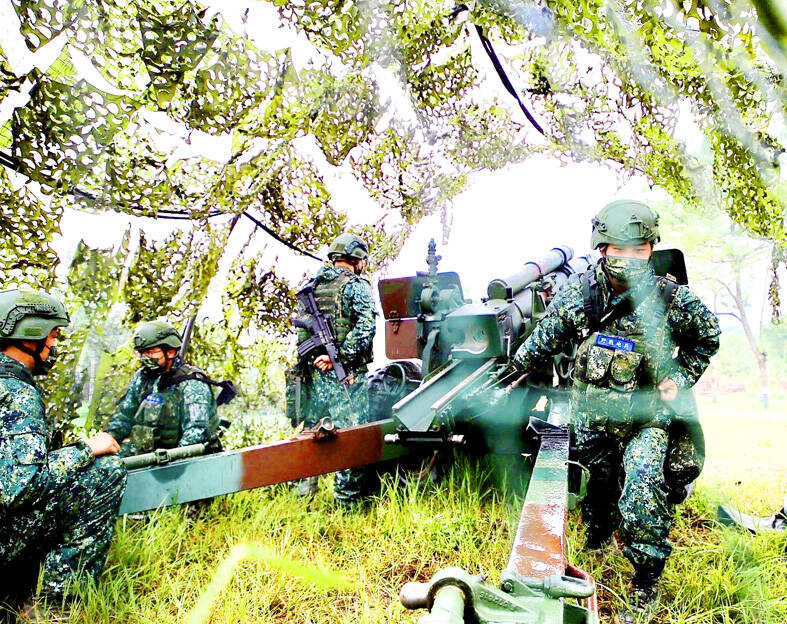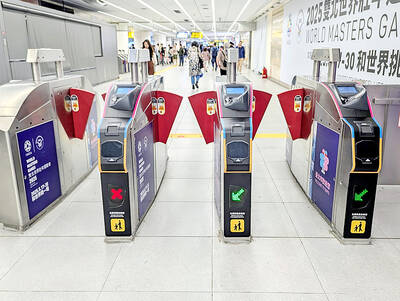New reserve brigades are to be formed to bolster the nation’s defense, a source familiar with military affairs said yesterday.
Following the establishment of new reserve brigades in Taichung, Kaohsiung, New Taipei City and Hsinchu County, four more brigades are to be established in the second half of this year, and 10 more next year, the source said.
President Tsai Ing-wen (蔡英文) in December last year announced a plan to reinstate one year of mandatory military service next year and to form a number of reserve brigades.

Photo courtesy of the Eighth Field Army
The brigades would be responsible for mobilizing reserve forces during wartime and supporting the main battle force, as well as garrison operations, the source said.
The Ministry of National Defense has been reinforcing local brigades since February by forming new reserve brigades, they said.
Army General Hsu Yen-pu (徐衍璞) attended the formation ceremonies of the four new brigades that have been established, indicating the importance of their formation, they added.
New reserve brigades would consist of about 200 soldiers each, with active-duty soldiers serving as brigadiers, battalion commanders and other senior staff, while 15 retired military officers would serve as instructors, the source said.
Each brigade can independently provide refresher training, and organize the mobilization and formation of reserve forces at the tactical level, instead of reserve force training centers, they said.
Chen Wen-jia (陳文甲), a senior consultant for the Institute for National Policy Research, said that forming 18 new reserve brigades would help improve the mobilization of reservists, but added that the regulations for mobilization should be flexible.
Rigid regulations would increase the risk of complications if an emergency order of mobilization is issued, he said.
The new brigades, which would consist entirely of infantry units, should be prepared for multidomain operations in terms of equipment and formation to face Chinese troops that might land in Taiwan, he said.
The traditional infantry organization of platoons, companies and battalions is not suitable for modern warfare, he added.

A magnitude 6.4 earthquake struck off the coast of Hualien County in eastern Taiwan at 7pm yesterday, the Central Weather Administration (CWA) said. The epicenter of the temblor was at sea, about 69.9km south of Hualien County Hall, at a depth of 30.9km, it said. There were no immediate reports of damage resulting from the quake. The earthquake’s intensity, which gauges the actual effect of a temblor, was highest in Taitung County’s Changbin Township (長濱), where it measured 5 on Taiwan’s seven-tier intensity scale. The quake also measured an intensity of 4 in Hualien, Nantou, Chiayi, Yunlin, Changhua and Miaoli counties, as well as

Credit departments of farmers’ and fishers’ associations blocked a total of more than NT$180 million (US$6.01 million) from being lost to scams last year, National Police Agency (NPA) data showed. The Agricultural Finance Agency (AFA) said last week that staff of farmers’ and fishers’ associations’ credit departments are required to implement fraud prevention measures when they serve clients at the counter. They would ask clients about personal financial management activities whenever they suspect there might be a fraud situation, and would immediately report the incident to local authorities, which would send police officers to the site to help, it said. NPA data showed

ENERGY RESILIENCE: Although Alaska is open for investments, Taiwan is sourcing its gas from the Middle East, and the sea routes carry risks, Ho Cheng-hui said US government officials’ high-profile reception of a Taiwanese representative at the Alaska Sustainable Energy Conference indicated the emergence of an Indo-Pacific energy resilience alliance, an academic said. Presidential Office Secretary-General Pan Men-an (潘孟安) attended the conference in Alaska on Thursday last week at the invitation of the US government. Pan visited oil and gas facilities with senior US officials, including US Secretary of the Interior Doug Burgum, US Secretary of Energy Chris Wright, Alaska Governor Mike Dunleavy and US Senator Daniel Sullivan. Pan attending the conference on behalf of President William Lai (賴清德) shows a significant elevation in diplomatic representation,

The Taipei MRT is to begin accepting mobile payment services in the fall, Taipei Rapid Transit Corp said on Saturday. When the company finishes the installation of new payment units at ticketing gates in October, MRT passengers can use credit cards, Apple Pay, Google Pay and Samsung Pay, the operator said. In addition, the MRT would also provide QR payment codes — which would be compatible with Line Pay, Jkopay, iPass Money, PXPay Plus, EasyWallet, iCash Pay, Taiwan Pay and Taishin Pay — to access the railway system. Currently, passengers can access the Taipei MRT by buying a single-journey token or using EasyCard,